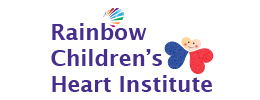Pediatric Heart Failure is a condition that affects children in which the heart does not function properly. This condition does not mean that the heart has stopped working completely, but instead that it isn’t working as efficiently as it is supposed to work. A normal pump function of the heart has to be maintained to ensure that the body functions properly. Along with this, optimal blood flow throughout the body is needed to function, develop, as well as, grow. When the heart doesn’t function properly, this condition is known as Heart Failure, and when it happens in children, it is known as Pediatric Heart Failure. It is caused mainly due to an abnormality of the cardiac structure that leads to failure of the heart function wherein the heart is unable to deliver oxygen as required. The condition can be life threatening and it is best to get your child checked by a children’s cardiologist near you.
Signs and Symptoms
In children, Pediatric Heart Failure is mainly caused due to either congenital heart disease or cardiomyopathy. These two conditions can result in Pediatric Heart Failure that has characteristic signs and symptoms such as
- respiratory distress
- edema
- exercise intolerance
- growth failure
- trouble breathing
- poor feeding patterns
- slow growth
- low blood pressure
- excessive sweating
Causes
Heart Failure in children can be caused due to multiple reasons, however the two main reasons are –
- Over-circulation failure: This happens when the blood inside the heart mixes and causes problems. This happens due to a congenital heart defect which leads to other severe problems. The cardiac chambers can be overloaded with blood which may prevent the heart from functioning properly. In newborns, this condition is mostly seen as a result of a problem they are born with. They might have some type of structural heart defects such as holes between the left and right chambers of the heart that may lead to intermixing of the blood.
- Pump failure: Pump failure happens when the muscles of the heart become weak or damaged and are therefore unable to pump the sufficient amount of blood to the body. The heart is no longer able to contract normally and this leads to heart failure. This may happen due to a pre-existing condition or may be caused due to some infection that damages the heart muscle. Pump failure can also be caused due to problems in the coronary arteries.
Problems outside the heart can also be a reason behind Heart Failure. A defect of blood vessels in any part of the body can also lead to the mixing of the oxygen-rich and oxygen-poor blood that can cause serious problems. With a simple search of children’s cardiologist near me, you will be able to conduct some tests and give you information about the cause of the problem. Another major reason causing Heart Failure in children is rheumatic fever and rheumatic heart disease.
Diagnosis
If you suspect that your child may have a heart condition, you should immediately take him/her to the best pediatric cardiologist in Hyderabad or can consult Rainbow Children’s Heart Institute for expert advice. Heart Failure is a serious condition and timely diagnosis can help you seek the correct treatment. Sometimes, heart failure can look like other problems such as pneumonia, colic, or other types of respiratory infections. Longer feeding times and loss of appetite can help you understand and identify symptoms. Some tests that a pediatric cardiologist may conduct are –
- Chest radiography (CXR)
- Electrocardiography (ECG): An electrocardiogram (EKG or ECG) will help the doctor in evaluating the heart rhythm.
- Echocardiography
- Ultrasound: The pediatric cardiologist may also order an ultrasound of the heart which will help in evaluating the structure and function of the heart.
- Chest X-ray: If a child shows heart failure symptoms, a chest X-ray will help in determining if the heart is enlarged or has an abnormal structure.
- Heart catheterization: Heart catheterization may also be used in a case where the results on any of the above tests are inconclusive or if the case is severe. This is a more detailed and invasive test that involves the insertion of a catheter in the heart to record oxygen level of the blood, blood pressure.
- Exercise stress test: Older children may also be asked to perform an exercise stress test that can evaluate the function of the heart.
Treatment
Although heart failure can happen to any child, a cause-centric treatment can help deal with the condition. Many of the causes can be repaired –
- Surgery may be required if heart failure is caused by over-circulation due to a congenital heart defect.
- Initially, the child may be treated with medications that will help in allowing the heart’s pump function to improve.
- Nutritional supplements may be given to promote growth if the cause is over-circulation.
- If heart failure is caused by pump failure, medications may be used to lower blood pressure to help the heart pump better.
- A pacemaker may be required if heart failure is caused by dangerously slow heartbeat. A pacemaker is a device that is implanted inside the body to help maintain a normal heart rate.
- If the heartbeat is too fast, the doctors may prescribe medications to control it.
- Radiofrequency ablation is a specialized heart catheterization technique that may be used to correct the abnormal heart rhythm in serious conditions. Radio waves are used to control the erratic beating of the heart.
- A special type of pacemaker is used in cases where the heart muscles are weak and medications do not help.
- Heart transplant is a way of treating this condition when no medications or devices can control the condition from worsening.
